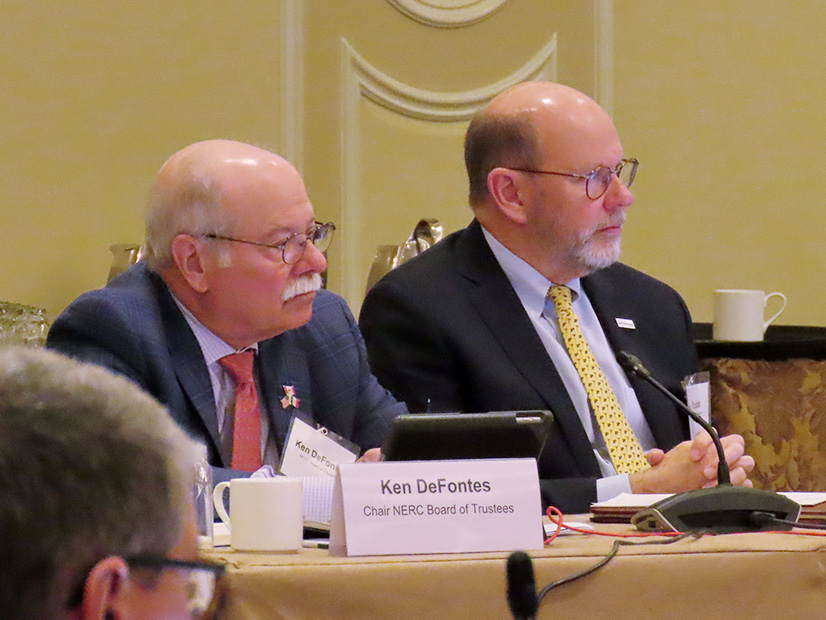HOUSTON — NERC Board Chair Ken DeFontes will hold the gavel for one more year after the organization’s Board of Trustees re-elected him at its quarterly open meeting Feb. 15.
The board chose Suzanne Keenan as vice chair and chair-elect, replacing current vice chair George Hawkins. Hawkins will continue to serve on the board, along with fellow trustees Larry Irving, Sue Kelly and Rob Manning, all of whom were elected to new three-year terms at the Feb. 14 open meeting of the ERO’s Member Representatives Committee.
NERC to Leave Atlanta Office
NERC CEO Jim Robb reported in his opening remarks that the organization has opted not to renew the lease on its Atlanta office when it expires in 2025. Citing positive industry responses to the ERO’s renovated office in Washington, Robb said NERC will step up its use of that space and of regional entities’ facilities. While NERC will continue to hold meetings and events in Atlanta, Robb said it is in talks to use a local coworking space.
NERC’s next board and MRC meetings will be at the Washington office in May, following a hybrid format in which only trustees and MRC participants attend in person and observers join remotely.
Cold Weather Standard Accepted
As the board voted on the new reliability standard EOP-012-2 (Extreme cold weather preparedness and operations), DeFontes applauded “the hard work on the part of the entire industry” that brought the standard to this point.
EOP-012-2 has been in development since February 2023, when FERC approved its predecessor EOP-012-1 with orders to NERC to draft a new standard within a year addressing its shortcomings. Getting the project to completion proved challenging, however. Industry stakeholders rejected the proposed standard in multiple ballot rounds, raising concerns among NERC’s leadership that FERC’s deadline might be missed.
The impasse reached a peak at the board’s last meeting in December, when DeFontes warned that the board might exercise its authority under Section 321 of NERC’s Rules of Procedure to approve a standard without a successful ballot. But this proved unnecessary after stakeholders approved the standard at its third ballot round in January with an 81% segment-weighted vote for passage. (See Industry Approves New Cold Weather Standard in Final Vote.)
Along with the cold weather standard, the board also agreed to submit for FERC approval a new set of definitions for NERC’s glossary affecting multiple standards. The terms are the result of Project 2022-01 (Reporting ACE definition and associated terms) and were approved in an industry ballot that concluded Dec. 20.
Soo Jin Kim, NERC’s vice president of engineering and standards, told trustees the project was started because the Eastern Interconnection was “experiencing more frequent events with regard to area control errors (ACE)” compared to the Western Interconnection.
The Reliability and Security Technical Committee’s Resources Subcommittee determined the current definition of Reporting ACE in NERC’s glossary did not allow the Eastern Interconnection to implement automatic time error correction processes. Kim said the changes will allow all interconnections to use time error correction and clarify what information should be used in calculating Reporting ACE.
Stakeholders Discuss ROP Changes
According to the agenda, trustees would have voted on proposed changes to NERC’s Rules of Procedure relating to registration of inverter-based resources after the standards actions. But DeFontes informed attendees that because of stakeholder feedback regarding this item, the board decided to host a discussion of the proposal instead. He said the discussion will inform the board’s vote on the measure “a week or two from now.”
NERC developed the proposed ROP changes last year as Stage 1 of its three-stage registration process, which FERC approved in May 2023 (RD22-4). They mainly will update the definitions of generator owner and operator to include entities with IBRs connected to the grid.
Howard Gugel, NERC’s vice president for compliance assurance and registration, opened the conversation by highlighting a “minor victory” in the fact that “everyone in here agrees [about] who needs to be registered,” citing widespread agreement on the proposal that entities operating IBRs with aggregate nameplate capacity of at least 20 MVA, working through a common point of connection with a voltage of at least 60 kV, should be considered part of the bulk electric system and subject to NERC standards.
However, he also acknowledged the concerns of many stakeholders that the proposed definition would be overly broad and disruptive to their businesses. Exelon’s Jennifer Sterling, for example, said many worried the proposed definitions would affect enforcement of standards and apply to utilities that they were not intended to.
“Being the engineer that I am, I was concentrating on the numbers and focused on that victory, and not realizing that there were some other key conversations that really needed to occur,” Gugel said.




